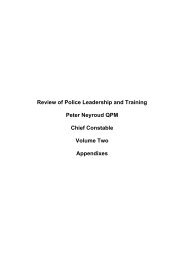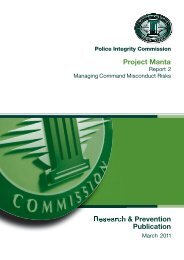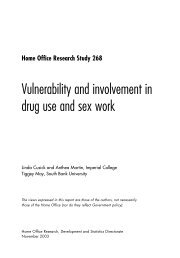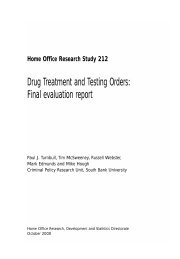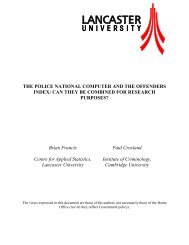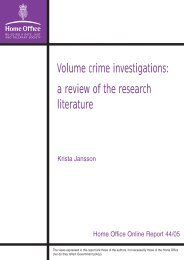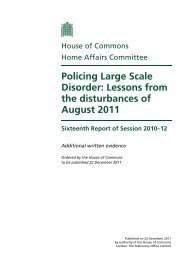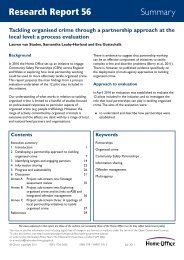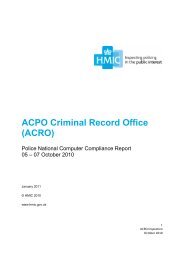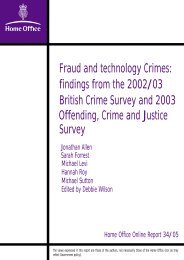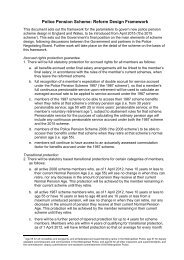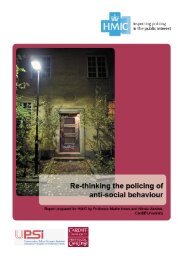Reducing Bureaucracy in Policing - Home Office
Reducing Bureaucracy in Policing - Home Office
Reducing Bureaucracy in Policing - Home Office
Create successful ePaper yourself
Turn your PDF publications into a flip-book with our unique Google optimized e-Paper software.
for the <strong>in</strong>troduction of locally elected Police & Crime Commissioners and the <strong>in</strong>troduction of a new<br />
National Crime Agency will, I am sure go some way towards br<strong>in</strong>g<strong>in</strong>g clarity to governance<br />
arrangements. In do<strong>in</strong>g so it will be important to ensure democratic accountability does not<br />
<strong>in</strong>crease parochialism and <strong>in</strong>compatible and dysfunctional systems and processes. In addition<br />
what happens <strong>in</strong> the <strong>in</strong>terim over the next 18 months to fill the vacuum?<br />
ACPO, supported by other key stakeholders (government, Inspectorates, Police Authorities, IPCC)<br />
must take responsibility for deliver<strong>in</strong>g the necessary change and provide the climate and culture<br />
where barriers to change are removed. The culture of each force is largely determ<strong>in</strong>ed by the chief<br />
officer through their approach to trust and risk and stance on the polic<strong>in</strong>g mission. The importance<br />
of <strong>in</strong>spired leadership where clear, simple ethical standards are consistently re<strong>in</strong>forced cannot be<br />
overstated.<br />
I welcome the appo<strong>in</strong>tment of Chief Constable Chris Sims to lead a strategic programme board,<br />
established to oversee and drive all work-streams relat<strong>in</strong>g to bureaucracy. In do<strong>in</strong>g so it will be<br />
important to identify where responsibility sits for ensur<strong>in</strong>g delivery of the various work-streams<br />
hold<strong>in</strong>g them to account and assess<strong>in</strong>g the practical impact of change on the frontl<strong>in</strong>e. The<br />
<strong>Reduc<strong>in</strong>g</strong> <strong>Bureaucracy</strong> Practitioners Group (RBPG) is best placed to provide this overview and<br />
bridge the gap between the strategic and the operational and I commend the board to use their<br />
experience.<br />
Accountability<br />
“If you have 10,000 regulations, you destroy all respect for the Law” - W<strong>in</strong>ston Churchill<br />
I have highlighted the impact of disproportionate and overlapp<strong>in</strong>g <strong>in</strong>spection and audit regimes.<br />
HMIC, IPCC and other regulators have a responsibility to adopt a more proportionate and<br />
measured approach, scal<strong>in</strong>g audits and related recommendations accord<strong>in</strong>g to known and<br />
anticipated risks and to simplify compliance requirements.<br />
Inspections have created an overwhelm<strong>in</strong>g demand for evidence, creat<strong>in</strong>g additional work for<br />
<strong>in</strong>dividuals, departments and forces. HMIC or any <strong>in</strong>spectorate should not demand or require any<br />
additional <strong>in</strong>formation to that which forces already collect and should seek to use it <strong>in</strong> the format it<br />
is produced <strong>in</strong>. The responsibility should be with HMIC to research and test, not for forces to<br />
produce reams of evidence.<br />
The <strong>in</strong>creased use of desk <strong>in</strong>spections by HMIC and others has exacerbated “tick <strong>in</strong> the box”<br />
compliance regimes and created a bureaucracy of back-office adm<strong>in</strong>istration. By way of a recent<br />
example, understandable concerns have been voiced about the disproportionate amount of<br />
evidence required to demonstrate compliance with the Protective Services Standard, <strong>in</strong>corporat<strong>in</strong>g<br />
162 separate standards and 1,099 questions! To be fair these have been reduced from 208/1350.<br />
Such is the impact; personnel are employed at each level of polic<strong>in</strong>g to demonstrate compliance<br />
and collect additional local data to counteract any criticism which may be made. I welcome the<br />
<strong>in</strong>itiative taken by Her Majesty’s Chief Inspector of Constabulary, together with ACPO and the<br />
NPIA, not only to rationalise the amount of doctr<strong>in</strong>e, guidance and policy, but also to apply a more<br />
sensible and proportionate approach to the demonstration of compliance.<br />
HMIC need to assist the police service <strong>in</strong> transform<strong>in</strong>g the way it works, bench mark forces on their<br />
knowledge and response to local problems and judge them on cont<strong>in</strong>uous improvement and quality<br />
of decision mak<strong>in</strong>g rather than compar<strong>in</strong>g proxy measures across forces. HMIC will also need to<br />
be explicit about future <strong>in</strong>spection requirements to enable forces to reconfigure and release staff<br />
from unnecessary data collection roles. Just because data might be easy to collect, does not mean<br />
it should be collected, it still creates a burden.<br />
11



